Below are some facts and opinions about dystopian cinema, focusing on movies that were released on VHS.
Crime Zone (1989)
Crime Zone is an American–Peruvian science fiction film by Roger Corman’s Concorde Productions. Definitely an exploitation film in the popular futuristic sci-fi genre, Crime Zone was released the same year as Cyborg with Jean-Claude Van Damme and Back to the Future Part II. It tells the story of two people who dare to escape a crime-ridden, power-hungry state by taking on a suicide mission in a seedy, cyberpunk crime zone.
THX 1138 (1971)

It’s the 25th century, a time when human beings have designations instead of names. In this society devoid of expression, a man, THX 1138, and a woman, LUH 3417, rebel against the rigid controls that hold them down. Directed by George Lucas, this is a bleak and terrifying look at a future that is not in our hands, it has been given over to machines.
Brazil (1985)

A bureaucrat tries to correct an administrative error and becomes an enemy of the state. Meanwhile, a mysterious woman from a recurring dream enters his life. Brazil was a favorite of Makoto Kobayashi, the creator of Dragon’s Heaven (1988) and named the Brazil Empire in the film after Terry Gilliam’s movie. The surreal style and comedic dialogue make Brazil almost a fever dream to watch, much like the rest of Gilliam’s portfolio.
Dark City (1998)
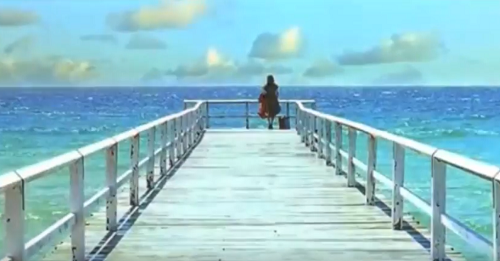
Dark City is one of a few films that seems to have had an influence on The Matrix (1999), especially the neo-noir look and concept of reality being simulation. There were other similar films like eXistenZ (1999) that seemed to just be a product of the time. In my opinion, Dark City stands out because of how closely it sticks to the noir tropes and because Jennifer Connelly is in it.
1984 (1984)

Based on the seminal novel by George Orwell, this is probably the most recognizable work of dystopian fiction. Living in a tyrannical and highly nationalistic dystopia, Winston Smith starts to rebel against his society and the ever-present Big Brother. “Big Brother” is a term that exists in regular speech and is ubiquitously understood to mean ‘the state’, thanks to how impactful the novel was on the world overall.
Soylent Green (1973)
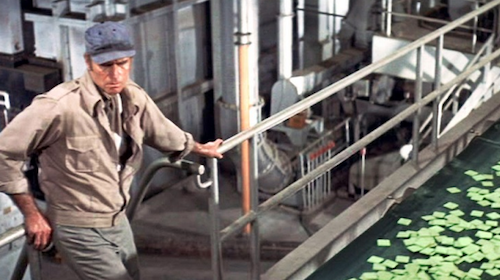
In a world ravaged by the greenhouse effect and overpopulation, this dystopian government is hiding an awful secret. This is eco-science fiction that I would place along with The Arrival (1996), The Day After Tomorrow, and The Last Winter. The story is about an NYPD detective who investigates the murder of a big corporate CEO. In this world, there is a vast disparity in the population’s quality of life and he must go between both worlds thanks to his line of work. What he discovers in his investigation is a repulsive and horrific conspiracy that affects everyone’s food supply. What is Soylent Green?
Warrior of the Lost World (1983)
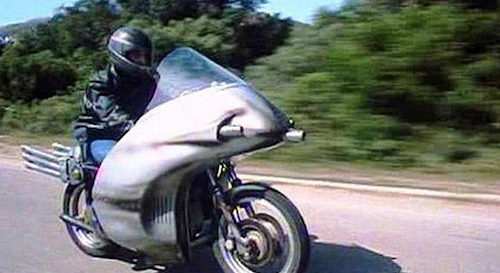
A nomad mercenary named ‘The Rider’ uses his high-tech motorcycle to help bring about the downfall of the evil Orwellian (see above) government, the Omega.
Rollerball (1975)
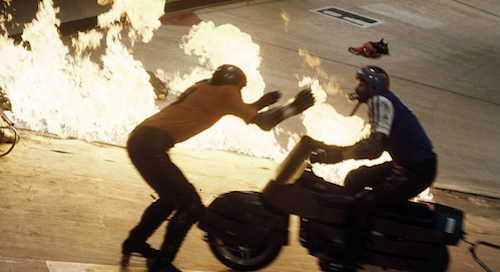
In a corporate-controlled future, an ultra-violent sport known as Rollerball has replaced war. Like the film Robocop, this work of speculative fiction asked the question “What if the current trends of violence in sports and entertainment continue?” Rollerball imagines a grim, dog-eat-dog world that is utterly desensitized to violence.
They Live (1988)
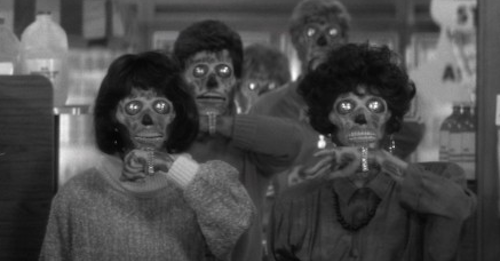
You won’t need special sunglasses to see why They Live is a very important entry into the genre of dystopian film. This science fiction/horror hybrid movie can be outrageous at times but it’s a perfect blend of sci-fi, satire, and cynicism with a dreamlike quality that reminds of the old serials. The soundtrack, amazing dialogue, and fast-paced story make this an incredibly fun movie. Once the action heats up, the overall concept just keeps getting cooler and cooler until the amazing finale.
The Running Man (1987)
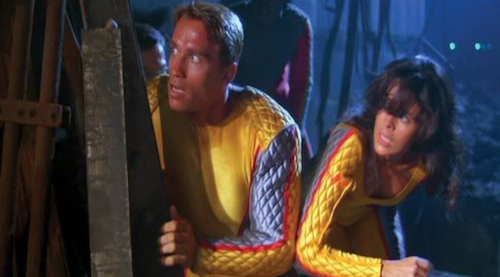
This film is very loosely based on the 1982 novel of the same title written by Stephen King and published under the pseudonym Richard Bachman. This movie is totally bad ass, all the way up until the end when Ben Richards sends Damon Killian to his doom and embraces Amber Mendez to the musical stylings of John Parr and Harold Faltermeyer. A classic.

